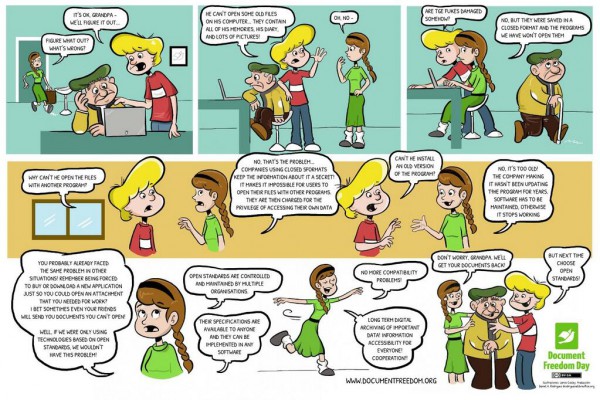Introducing the Document Liberation Project
![]() The Document Foundation blog today announced the birth of the Document Liberation Project, a home for the growing community of developers united to free users from vendor lock-in of contents. Together, these hackers will offer a solution to the routine problem faced by many computer users who have their personal digital contents stored in an old, outdated and inaccessible file format.
The Document Foundation blog today announced the birth of the Document Liberation Project, a home for the growing community of developers united to free users from vendor lock-in of contents. Together, these hackers will offer a solution to the routine problem faced by many computer users who have their personal digital contents stored in an old, outdated and inaccessible file format.
A routine problem encountered by computer users today is the discovery of personal digital content created years ago and stored in old, outdated file formats. These old files often cannot be opened by any application on the user’s current operating system. The users are quite simply locked out of their own content. The most common reason for this inability to access old data is the use of proprietary file formats that result in vendor lock-in.
The Document Liberation Project has been created in the hope that it would enable individuals, organisations and governments to recover their data from proprietary formats and provide a mechanism to convert that data into open file formats, returning effective control of the content from software companies to the actual authors.
The Document Liberation Project believes:
- documents and their content belong to their creators, not software vendors;
- that access to content you own should not be hindered by the fact that the application that created it is not maintained any more or that the application does not work on the particular operating system that you use;
- that use of truly open and free standards for encoding digital content is the only long-term guarantee that a user’s digital content will never be beholden to a single vendor;
- that implementation of free and open source software that can read proprietary file formats is the best solution to escape vendor lock-in during the transition period to truly open and free standards.
Its mission is as follows:
- to try to understand the structure and details of undocumented proprietary file formats;
- to use that understanding of the file formats to implement libraries that are able to parse such documents and extract as much information as possible from them;
- to use our existing framework to encode this data in a truly free and open standard file format: Open Document Format.
Developers have so far provided read support for proprietary file formats including MS Visio, CorelDraw, MS Publisher, Apple Keynote and a handful of different old Macintosh formats. In addition to LibreOffice, import libraries for these file formats are used by Abiword, Calligra, CorelDRAW File Viewer, Inkscape and Scribus.
 As announced in September 2013, the OSB Alliance’s Office Interoperability Working Group has held a requirements engineering workshop in Stuttgart. OSB Alliance members Munich city council, Leipzig city council, Jena city council, the Swiss Federal Court, and the Swiss Federal IT Steering Unit FITSU defined commonly required improvements for the open source LibreOffice and OpenOffice suites. Other public authorities will providing supporting funding.
As announced in September 2013, the OSB Alliance’s Office Interoperability Working Group has held a requirements engineering workshop in Stuttgart. OSB Alliance members Munich city council, Leipzig city council, Jena city council, the Swiss Federal Court, and the Swiss Federal IT Steering Unit FITSU defined commonly required improvements for the open source LibreOffice and OpenOffice suites. Other public authorities will providing supporting funding.


 Today is
Today is 

 The first alpha of the installation media for Debian 8 (codenamed
The first alpha of the installation media for Debian 8 (codenamed  The government of Italy’s Autonomous Province of South Tyrol wants to save &euro 1 mn. per year by using free software, according to a
The government of Italy’s Autonomous Province of South Tyrol wants to save &euro 1 mn. per year by using free software, according to a  WordPress’ pingback function can be abused to mount a denial of service (DoS) attack on blogs without their owners noticing, Germany’s
WordPress’ pingback function can be abused to mount a denial of service (DoS) attack on blogs without their owners noticing, Germany’s